Christopher Mellor Ridley was born in Springfield, the grandson of the founder of the brewers and milers T. D. Ridley and sons. He was educated at Broadstairs and Rugby and then joined the family brewery as a maltster. He was a Territorial soldier before the war, transfered to the regulars and gained his commission in December 1914. He went to the Front in France in July 1915 and was wounded on the opening day of the Battle of the Somme in July 1916. In October 1916, by then a Captain, he was killed when a shell struck his dug out and exploded. His home was in Springfield Road. A brother also lost his life during the war.
RIDLEY, CHRISTOPHER MELLOR,
Captain, 10th (Service) Battalion, Essex Regiment
Christopher suffered a gun shot wound to his left shoulder. The wound was described as ‘severe’, but ‘not permanent.’ It was estimated the wound would take ten weeks to recover. A medical board held on 8th September 1916 reported:
“The Board find a rifle or machine gun bullet struck him just under the centre of the left clavicle and emerged a little lower, just over neck of left scapula....The wounds are clean and healing well. X-rays show no injury to bone, no lung injury. His shoulder isstill stiff from injury of the deltor muscle, General health good.
Christopher embarked for England on 6th July 1916 from Calais, arriving in Dover on board the Stad Antwerpen. The following day the Essex Weekly News reported:
“Capt. C. M. Ridley, Essex Regt., son of Mrs. Walter Ridley, of Springfield Tyrells, was slightly wounded on July 1, but is quickly recovering in hospital.”
In early October 1916 Christopher returned to the 10th Battalion of the Essex Regiment at Forceville and took over A Company. While he was away the battalion had been involved in costly fighting at Delville Wood and to take Thiepval at the end of September 1916 and few of its original soldiers remained.

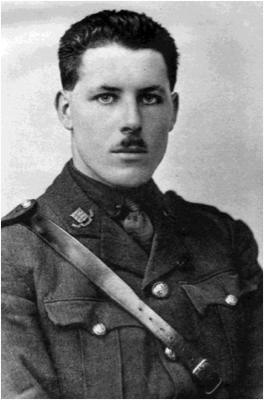
Christopher was born at Redgates (later known as Bishopscourt) in Springfield Road on 3rd December 1890, the second son of Walter Ridley (1848-1900) and Louisa Catherine Ridley (nee Mellor). Christopher’s paternal grandfather was Thomas Dixon Ridley founder of the Essex brewers T. D. Ridley & Sons Ltd. in 1842. Christopher’s father had been born in Chelmsford; his mother in Stainland, Yorkshire in 1854. The couple had married at St. James’ Church, Picadilly, London on 23rd February 1876, and in 1881 had been resident at the Mill House, Hartford End, before moving in to the newly-built Redgates in 1889.
Christopher’s siblings included Winifred Mary Ridley (born in 1877 in Felsted, died in 1950), Catherine Muriel Ridley (born in 1880 at Hartford End, died in 1919), Thomas Dixon Ridley (born in 1882 at Hartford End, died in 1961), Helen Margery Ridley (born in 1885 at Hartford End, died in 1974), Walter Lancelot Ridley (born in 1892 at Redgates, died 1953) and Herbert Leslie Ridley (born in 1894 at Redgates).
The 1891 census found Christopher at Redgates, Springfield aged 4 months, living with his parents, four siblings and six servants. His father was a brewer & maltster.
Christopher’s father died at Redgates in September 1900, News of his death was reported in a
Chelmsford newspaper on 28th September:
“DEATH OF WALTER RIDLEY OF SPRINGFIELD. We regret to announce the sudden death of Mr. Walter Ridley, of Redgates, Springfield, which took place at his residence Monday forenoon.
His wife had been out on parochial work, and on returning was greatly shocked to find him dead, sitting in his study chair. Mr. Ridley was about on Sunday, and at church, and Saturday he was also out of doors.
The deceased gentleman, who was 52 years of age, was the youngest son the late Mr. Thos. Dixon Ridley, the Elms, Broomfield-road, Chelmsford, and was member of the firm T. D. and Sons, millers, maltsters, and brewers, whose name is known throughout United Kingdom. He was educated at Uppingham. In his work he was more particularly associated with the brewery at Hartford-end.
Mr. Walter Ridiey was a gentleman of kindly, but most unobtrusive manners, and took little part in public affairs. He did, however, sit for a time the representative of the Springheld Division on the Essex County Council, in which position, though he did little or no talking, he was found to be of real service.He was also member the Springfield Parish Council, and, up to last Easter, one of the churchwardens of the pariah.
Some months ago he was stricken with illness which appeared very serious, but seemed to the casual eye recovered until recently, when he became visibly weaker. It was known, however, his malady would end fatally. About a week before his death consulted sir Wm. Broadbent.
Mr. Ernest Ridiey, the deceased gentleman's brother, was last week in Scotland on a shooting excursion. While on the moors he received » telegram announcing the death, and, singular to relate, when he returned to the house at which he was staying he found a letter from his brother which he had written to him on the Saturday.
Mr. Ridley built the handsome house in which he has for some years resided, and laid out the grounds. He leaves a widow and seven children. During his illness tie was attended by Dr. Storrs.
The deceased gentleman was a thoroughly good sportsman, very fond of hunting, and a member oi the Essex Union Hunt.
The body will be removed from Redgates to All Saints' Church this (Friday) evening, and there will early celebration of the Holy Communion in the Church to-morrow imorning, the members the family will attend. The body will remain in the Church until 2.15 in the afternoon, when a funeral service will be held. The interment will subsequently take place in Holy Trinity churchyard.
The census the spring after Christopher’s father’s death recorded Christopher at Hildersham House in Broadstairs, Kent, aged 10. He was subsequently educated at Rugby School from Jan 1905 to 1908, leaving after 5th form.
His mother moved from Redgates to Springfield Tyrells (then 78 Springfield Road, pictured) in Springfield in 1907. The house had been put up for sale after the death in April 1907 of its owner Charles Bramston Osborne Gepp. His son, Charles Edward Gepp, who was killed during the war, had been born there in 1898. Redgates was later home to the Bishop of Chelmsford and was demolished in the 1980s.
The 1911 census found twenty year-old Christopher living with his widowed mother, sister Winifred, brother Lancelot and three servants at Springfield Tyrells. Christopher was described as maltster. His brother was an accountant pupil.
Prior to the war Christopher was employed at the family firm’s Steam Mills in Chelmsford. He served for five years as a Territorial in the 5th Battalion Essex Regiment, four of which were as an officer.
At the end of October 1914 Christopher applied for an officer’s commission. His application form included a personal reference from the Chief Constable of Essex confirming that Christopher was of good moral character. The Rector of Springfield also signed the application, confirming that Christopher had received a good standard of education.
In November 1914 Christopher joined the 10th Battalion of the Essex Regiment, which formed part of the 53rd Brigade in the 18th (Eastern) Division, stationed at the Hyderabad Barracks in Colchester. His application for a commission was successful and he was made Lieutenant on the 2nd of the following month, by which time the composition of the Battalion had almost been completed. Training on the parade ground gave way to field training, which included a march into Suffolk.
On 8th April 1915 Christopher gave away his sister Winifred at her marriage to William Graham Gilmore at St. Alban’s Church, Holborn, London, an event officiated by Christopher’s uncle, the Reverend David Green, vicar of Bromley.
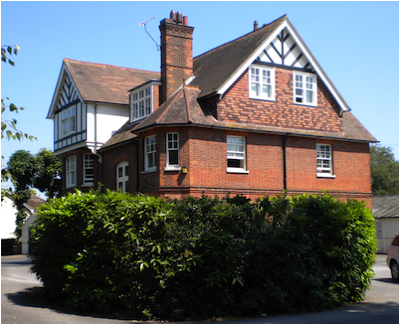
In May 1915 Christopher’s battalion left Colchester for final training at Codford-St.-Mary on Salisbury Plain.
On 25th July 1915 Christopher, along with the rest of his comrades in the 10th Essex Battalion was taken by train from Wylye in Wiltshire to Folkestone in Kent for the trip across the Channel to Boulogne, France. Christopher was a Lieutenant in C Company which was led by Captain J. L. Lewis.
The following month it went to Bouzincourt and into the line facing Thiepval Wood with the 51st Highland Division for
instruction in the art of trench warfare. In August 1915 Christopher was promoted to Captain and his battalion moved to Bray-sur-Somme in reserve.
On 5th September 1915 the battalion moved up from Bray to the front line at Mametz to relieve the 6th Battalion of the Royal Berkshire Regiment. Christopher’s battalion was to stay in the area until the end of the year, spending time in the front line and in support in rotation. Fortunately it was a quiet part of the line. On 23rd September 1915 it was reviewed by Earl Kitchener in a field near Ribemont and on 25th October 1915 the battalion was inspected by King George V and President Poincare.
After Christmas the 10th Battalion of the Essex Regiment moved slightly further south in same sector and once again the tour was quiet. They then moved to Franvillers and Christopher took over C Company following promotion of Captain J. L. Lewis.
Between mid March and early May the battalion took over line at Maricourt Wood. The second half of May and June were spent preparing for the forthcoming Somme offensive.
On the evening of 30th June the battalion moved up Spring Avenue ready for the offensive which began the next day, with Christopher leading C Company, and Arthur Pochin one of his three Second Lieutenants. Two platoons from C Company accompanied the 6th Battalion of the Royal Berkshire Regiment which was to attack on the left with a final objective of Montauban Alley, the last trench in the German’s first system of defence. The remaining two platoons, plus comrades from B Company were to advance an hour later to open up the two main communication trenches ‘Mine Alley’ and ‘Popoff Lane’. Christopher was wounded while assisting the Royal Berkshire Regiment on the left. A post-war account reported:
“On the left Captain C. M. Ridley [C Company] had sent Lieut. T. A. Evans and Lieut. A. C. Pochin to mop up with the Berkshires. Evans was wounded at the outset, Pochin a little later; Ridley himself was wounded during the morning whilst supervising the work of his company.”
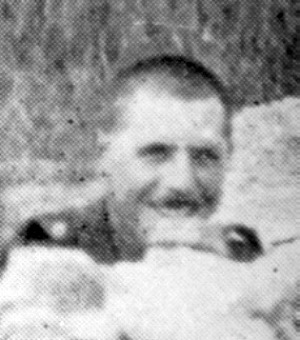
he battalion’s next major objective was to advance 250 yards to help capture Regina Trench some seven miles north of Albert. In wet conditions it did so on 21st October 1916, with few casualties in the assault on the trench, but many in holding it. By the time the battalion was relieved two days later and went back to Albert it had suffered six officers wounded, 18 men killed, and 96 wounded. On 29th October 1916 the battalion was ordered to relieve other troops of the 18th (Eastern) Division now in the front line. A post-war account of the battalion recalled:
“In the first instance we were in support positions in and about Rifle Dump. Rain fell heavily during our stay here, and every form of shelter the individua man erected for himself in Zollern Trench fell in.
On the afternoon of 31st October we went up in very little packets (twos and threes) to relieve the 6th Royal Berks Regiment in Regina Trench. The portion we took over
was that straddling a well-known long valley leading down to Miraumont - Death Valley, it was named subsequently. Battalion H.Q. moved up to Hessian Trench, and from here the whole of our front line could be surveyed. We suffered one casualty from enemy artillery during the relief.
Captain C M Ridley, better known perhaps as ‘dear old Riddles’, was killed shortly after he had arrived in the front line. A very enthusiastic soldier and greatly missed. We buried him near the Battalion H.Q. in Zollern Trench we had just left.”
Christopher was aged 25 when he was killed.
His Major later wrote:
“He was a splendid fellow: I, myself, feel his loss very much, as we both served in the same company for so long, and I shall miss him greatly.”
One of his soldiers stated:
“He was my Company Commander, and he was one of the best officers we have had. No words of praise are too good for him as he was so brave and cool under fire. He was a friend, as well as officer, to the boys, and they would follow him anywhere, and everyone had a good word for Captain Ridley.”
On 4th November 1916 Christopher’s mother received the dreaded telegram informing her of her son’s death.
The Essex County Chronicle of 10th November 1916 announced his death in the following report:
“Capt. Christopher M. Ridley. Essex Regt., second son of the late Mr. Walter Ridley, of Redgates, Chelmsford, and of Mrs. Ridley. Springfield Tyrells, was killed instantaneously by a shell while sitting in a shelter in front-line trenches. Deceased, who was 26 years of age, was keenly interested in the Springfield Boy Scouts. He had been at the Front since July 1915, He was wounded in the big push of July 1st this year, and returned to the Front in September, His youngest brother, Leslie, is a Captain in the Dublin Fusiliers.”
The same day’s Essex Weekly News reported:
“Capt., Christopher M. Ridley, Essex regt., killed in action on Oct 31, was the second son of the late Mr. Walter Ridley, of Redgates, Chelmsford, and Mrs. Ridley, of Springfield Tyrells, Chelmsford. The gallant officer was killed by a shell while in his dug-out in the front line trenches. Capt. Ridley was a keen supporter of the Boy Scout movement, being for a time, hon. secretary of the Chelmsford and District Association, while he was also associated with the Springfield Troop. Deceased’s youngest brother, Capt, Leslie Ridley, is serving in the Dublin Fusiliers.”
The same paper carried the following family announcement:
“Ridley. - Killed in action on October 31st, Christopher M. Ridley, Captain, Essex Regt., second son of the late Walter Ridley, of Redgates, and Mrs. Ridley, Springfield Tyrells, Chelmsford, aged 25 years.”
Christopher was later buried at Courcelette, but today no has no known grave and is commemorated on the Thiepval Memorial, near Albert, Somme, France, also commemorated on the Civic Centre Memorial, Chelmsford and on the Springfield Parish Memorial at All Saints’ Church.
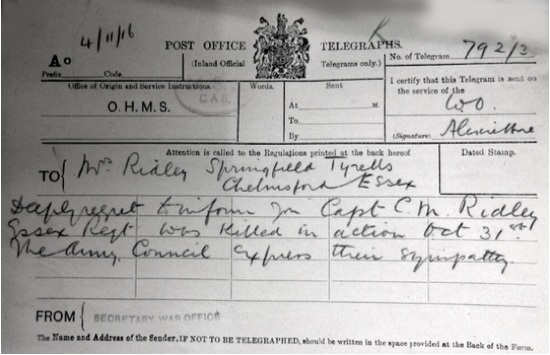

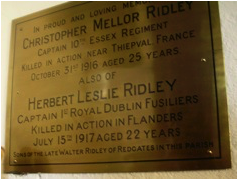
Christopher was entitled to the 1914-15 Star, British War Medal, and Victory Medal. He left an estate valued at £8,013 1s. 4d.
His brother Herbert Leslie Ridley was killed in 1917.
The 1918 register of electors listed their mother at 78 Springfield Road, Springfield (later known as 250). She died in 1943, aged 88.
On 8th January 1943 the Essex Chronicle reported:
“The death occurred at Springfield Place, Chelmsford, on Tuesday, in her 89th year, of Mrs. Louisa Catherine Ridley, widow of Mr. Walter Ridley, a member of the well-known Essex firm of milers and brewers founded
by his father, the late Mr. Thomas Dixon Ridley. Mr. and Mrs.Walter Ridley lived for many years at Regates, Springfield (now Bishopscourt, the residence of the Bishop of Chelmsford). Mr. Ridley died 38 years ago, and Mrs. Ridley subsequently resided for a long period at Springfield Tyrells, moving to Springfield Place four years since. Until last September, when she fell and broke her hip, Mrs, Ridley had been a very active lady, being a fine, upstanding figure and well preserved for her age. She took a keen interest in church work at springfield and was a most kindly district visitor. Any good cause found her a ready friend.
Of the four sons, Capt. Leslie Ridley and Capt. Christopher Ridley were killed in the ;ast war. Those surviving are Mr, Thomas Ridley, of Eastbourne, and Lieut.-Col. W. L. Ridley, of Springfield Place, a former Commanding Officer of the 5th Essex Regt. There are also two daughter (Mrs. Gilmore, of Galleywood, and Mrs. Fletcher, of Little Waltham).
The funeral of Mrs Ridley is fixed for today, service ar 2.30 to precede interment in Holy Trinity Churchyard.
131222